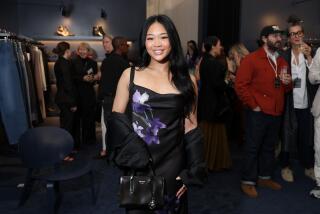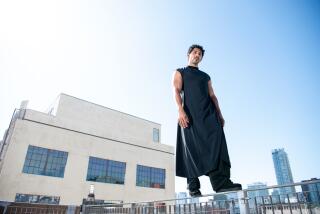Styles With a Sizable Difference : Fashion: Retailers are tailoring clothes to fit the tastes and ‘body types’ of African-American women. Critics call such targeted marketing ‘a dangerous thing.’
- Share via
National retailers have been sizing up African-American shoppers lately, and not everyone is thrilled with their intentions--to use differences in body type as a marketing tool.
Last August, JC Penney launched a new fashion catalogue, Influences, that company officials say “caters to the clothing tastes and size needs of African-American women.”
Spiegel, the Chicago-based mail-order giant, is following suit with E Style, a 64-page catalogue of clothes and accessories co-produced by Ebony magazine that will be delivered to 1.5 million African-American households in September.
While many black consumers welcome the wave of targeted marketing that promises to make finding the right clothes easier, others warn that playing up physical differences among races is a tricky, divisive business.
“We see this as an opportunity to serve a customer who isn’t having her needs met currently by retailers,” Spiegel spokeswoman Ann Morris says of E Style. She declined to discuss how its sizes and selection might differ from that in other catalogues, but Linda Johnson Rice, president and chief executive of Ebony’s owner, Johnson Publishing, recently told the New York Times: “Spiegel has done its homework (with E Style). What they’ve done is taken a random selection of black women with different body types and analyzed them, so that when the clothes are manufactured, they fit the needs of black women.”
Penney’s used African-American fit models to come up with sizes--generally, more generous in the hips and thighs--for its Influences clothing by designer Anthony Mark Hankins. “We are building the collection with a particular set of specifications in mind,” says merchandise manager Barbara Bierman, adding that some of the clothes will be available in stores this fall.
Carl Jones, co-owner of the fast-growing L.A.-based sportswear company Cross Colours, has no problem with using body type as a marketing tool. African-Americans--men, too--have been long neglected by retailers, he says. “We thought that the fit that was out there was not a fit that catered to the African-American male body, which tends to have a smaller waist, wider hips, bigger thighs and longer arms than the average Anglo man,” Jones notes. “And a lot of African-American women have very small waists but wider hips than other women.”
But Lois Anderson, curator of the Black Fashion Museum of Harlem and author of “Blacks and the History of Fashion,” says talk about size differences between blacks and whites is “just a bunch of malarkey.”
“There is absolutely no difference in people’s bodies to that extent. It sounds good,” she says, “but there is no truth to it at all.”
Byron Lars, a successful New York-based women’s wear designer, finds the new marketing efforts blatantly offensive. “To separate African-Americans from the rest of the American population is a very dangerous thing,” he says. “It’s what we’ve worked so long and so hard to combat and this is just a slap in the face and a step backward.”
Sales will ultimately decide the fate of the trend. “It’s hard to make a profit without filling a need,” says Bobby Glanton-Smith, sales and marketing director for Recycling Black Dollars, an Inglewood group that promotes black-owned businesses. “Business is parasitic, so I don’t think it’s necessarily exploitative to market to a race of people. The stores have just refined their marketing strategies to meet the needs of a specific audience. What’s wrong with that?”
Robert Goldman, a sociology professor at Lewis & Clark College in Portland, Ore., and author of a new book on the social ramifications of product marketing, “Reading Ads Socially,” sees the potential for misunderstanding.
“It all sort of resembles this movement toward multiculturalism,” Goldman says. “And the danger with multiculturalism is this thing called identity politics, where one group sees another’s benefits coming at their expense. Certainly it will be perceived as leading to greater divisiveness (between races). While at the same time there’s a kind of flattery involved that will probably prove effective.”






